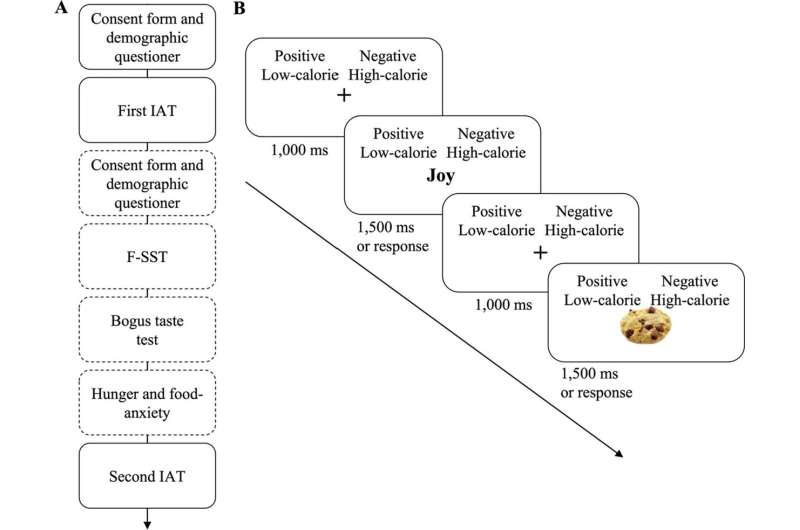This article has been reviewed according to Science X's editorial process and policies. Editors have highlighted the following attributes while ensuring the content's credibility:
fact-checked
trusted source
proofread
Flexibility can support healthy eating behaviors among women

A recent study at the Hebrew University aimed to improve attitudes toward food in women with restrained eating habits who monitor their diet by training them to respond more flexibly to food cues. The results indicated that only participants in the flexible response group showed increased positivity toward food.
This research underscores the potential benefits of promoting flexible responses to food cues, providing valuable insights for interventions to enhance eating behaviors and attitudes in this population. Such interventions could greatly benefit individuals with controlled eating habits, offering valuable insights for improving their eating behaviors and attitudes, potentially leading to healthier relationships with food and improved overall well-being.
The new study led by Ph.D. student Shir Berebbi and team under the guidance of researcher Prof. Eyal Kalanthroff at the Psychology Department at the Hebrew University unveiled findings indicating that women who watch their diet can significantly enhance their attitudes toward high-calorie foods through a flexible response to food-related stimuli.
The findings were clear: the group that used the flexible response method had a big boost in liking high-calorie foods after the program. The other groups didn't show any noticeable change in how they felt about food. This shows that when people with controlled eating habits balance how they react to food cues, they can feel better about what they eat.
Restrained eaters typically maintain a chronic avoidance of eating to control weight, leading to a negative emotional response towards food. Previous attempts to disrupt this pattern by encouraging the complete elimination of inhibitory food responses resulted in increased food consumption but also elevated food-related anxiety.
The study involved 78 female participants identified through the Dutch Eating Behavior Questionnaire for their restrained eating patterns, characterized by chronic dieting and food intake control. Researchers used psychological tests like the Implicit Association Test (IAT) and Food Stop-Signal Task (F-SST) to assess subconscious food attitudes and impulse control. A bogus taste test measured actual food consumption.
The study also introduced a flexible food response task, where participants had to either respond to or inhibit their response to different food stimuli, pioneering new approaches to understanding eating behaviors.
The results were prominent as only the group exposed to the flexible response protocol showed a significant improvement in positive attitudes toward high-calorie foods after the intervention, with no observable changes in the negative attitudes among the other groups. This outcome suggests that a balanced approach to responding and inhibiting food cues can foster more positive emotional reactions to food among those with restrained eating behaviors.
Moreover, the flexible response training demonstrated promising potential in moderating how participants engaged in a seemingly unrelated bogus taste test, showcasing more balanced eating behaviors compared to other groups.
"Our findings are pivotal as they suggest a new therapeutic avenue that could potentially aid individuals with disordered eating patterns to redefine their attitudes towards food," said Ph.D. student Shir Berebbi. "By advocating for flexibility rather than rigid response or inhibition, we can support more sustainable and healthy eating behaviors."
This study offers a fresh perspective on treatment and support for individuals struggling with restrained eating and proposes that encouraging a balanced approach to food cues may prove more beneficial than methods that promote extreme responses.
The findings are published in the Journal of Eating Disorders.
More information: Shir Berebbi et al, Fostering positive attitudes toward food in individuals with restrained eating: the impact of flexible food-related inhibition, Journal of Eating Disorders (2024). DOI: 10.1186/s40337-024-00995-0




















